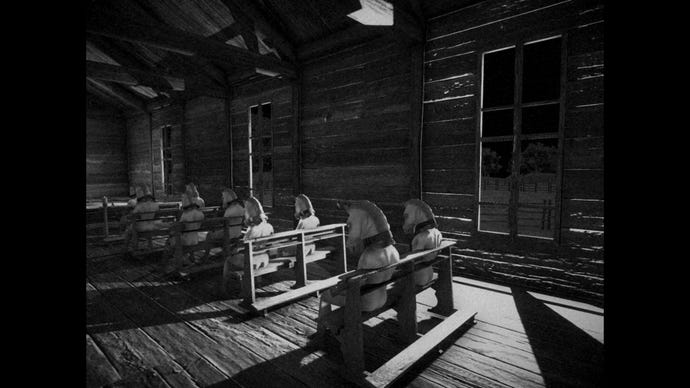[ad_1]
Being at once repellent and compelling is some kind of criterion for Real Art Status, and Horses – developed by Saturnalia developers Santa Ragione and directed by Andrea Lucco Borlera – certainly earns that accolade. Out later in 2024, this first-person horror game takes inspiration from the Surrealism art movement and from silent cinema, with monochrome visuals, speech cards in place of spoken dialogue, and rickety live-action footage for certain animations and transitions. But it’s also, I think, a meditation on the unique kinds of grotesque only videogames can produce, one that goes beyond the mere portrayal of squalor and bloodshed to explore particular generations and traditions of videogame graphics that are intrinsically cursed. It stood out amid the breezy action games and cosy life sims of this year’s Day Of The Devs expo in San Francisco like a bell-tolling plaguebearer in a crowd of Tellytubbies.
The premise is that you’re a harried young man who must spend 14 summer days helping out on a farm, which harbours a terrible mystery. As the curtain rises, you walk up to the gate and bid good day to the Farmer, who is perhaps the worst thing in a game that “features scenes of physical violence, psychological abuse, gory imagery (mutilation, blood), depictions of slavery, torture, domestic abuse, sexual assault, and substance abuse”.
 Horses – Exclusive Trailer | Black Summer 2023
Horses – Exclusive Trailer | Black Summer 2023
The Farmer occupies a point on the Uncanny Valley I would approximately date to the normalisation of 3D lip-synching animations in the early noughties, back when videogame cutscenes were truly unholy artefacts and fuel for youtubehaiku. His eyes are frail and unblinking faceted orbs in a face of sour cream, with deeply worrying wrinkles and fissures that, you somehow sense, travel the entire length of his body. His body is a bulbous and spindle-edged dollop of mashed potato stuffed into a creased vest and trousers.
The Farmer’s teeth – frequently and maliciously framed in close-up during dialogue – look like they’re about to fall out of the screen and scatter between your toes. When he turns away to show you around the farm he looks like a plasticine doll manipulated by unseen, cruel hands, his head twisting painfully and his strides not quite matching his rate of travel. You have to fight down the instinctive desire to set him and the game on fire. And yet, this creature is your host and employer. You must water the vegetable patch and pull carrots at his command – an obnoxiously straightforward process of fetching the watering can and lumbering between button prompts. You must dine with him, peeking over the edge of a dining table at those gnashing teeth, like a child hiding from an ogre. You must sleep in the same building as him. And you must tend to his livestock.
The other occupants of the farm are hacked from the same vein of digital ghoulishness. There’s a dog which is essentially a floating head poking out of a blackbox kennel, its eyes rolled comically to one side, neither dead nor alive. The titular horses, meanwhile, are the soiled and suffering love children of Garry’s Mod and Pathologic. They’re naked people with horse heads and pixelated gonads. You first encounter them jammed into a pen that doesn’t allow them to sit, and are promptly invited to ride one around the farm, racing the Farmer in third-person view. Not long after, there’s a depiction of a suicide and the task of disposing of a body, carried out in the same perfunctory, A-to-B fashion as pulling carrots. It’s safe to say that Horses doesn’t have much in common with Stardew Valley.

You might also say that Horses doesn’t have much in common with, say, Horizon: Forbidden West or GTA 6 or any other glossy photorealistic blockbuster in which characters look and move with more-than-lifelike splendour. The thing about visuals such as those is that they often hide a lot of ugliness – colossal overwork, for example, or the fact that your horse in the original Assassin’s Creed is actually “a twisted fucked up human skeleton”, to quote former Ubisoft developer Charles Randall.
I’m not going to launch into a(nother) lecture here about the buried evils of triple-A software development, not least because I have to run off now and see a comparatively restful game set in historic Iceland. But I do find it invigorating to play a game like Horses, which takes the specific varieties of ugliness only videogames are capable of and leaves them proudly on the surface.
[ad_2]
Source link


